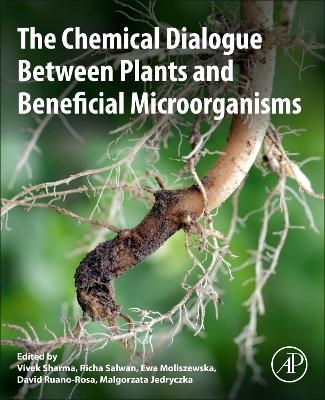
The Chemical Dialogue Between Plants and Beneficial Microorganisms
Academic Press Inc (Verlag)
978-0-323-91734-6 (ISBN)
Dr. Vivek Sharma is currently an Assistant Professor at the University Centre for Research and Development at Chandigarh University, Mohali (PB). He has more than 12 years of research experience exploring molecular attributes of Trichoderma. His research also involves examining the molecular aspects of microbes beneficial to plants such as Streptomyces, and Bacillus. He has published several research papers in international journals, serves as an Academic Editor for PLOS ONE, the review editor for Frontiers in Bioengineering and Biotechnology, an Associate Editor of Chemical and Biological Technologies in Agriculture, and is a member of the editorial board of Current Proteomics. He is also a recognized reviewer for journals such as the Journal of Advanced Research, Applied Microbiology and Biotechnology, Environmental Research, the Journal of Proteomics, BMC Genomics, BMC Plant Biology, AMB Express, Molecular Biotechnology, MDPI Pathogens, Folia Microbiology, Physiological and Molecular Plant Pathology and Archives of Microbiology. Dr. Salwan is currently an Assistant Professor (Microbiology) at the College of Horticulture and Forestry (Dr. YS Parmar University of Horticulture and Forestry), Neri, Hamirpur, Himachal Pradesh, India. Dr. Salwan’s research interests and contributions are on the diversity of psychrotrophic bacteria from the Western Himalayas and their utilization for industrial applications. She has also worked on the exploration of extremophiles for industrially relevant enzymes and plant beneficial microbes for agricultural benefits. She has published two books and numerous research papers in several international journals. Dr. Salwan serves as an Academic Editor for PLOS ONE and is also a recognized reviewer for several journals including MDPI Genes, MDPI Diversity, MDPI Foods, BMC Microbiology, Journal of Plant Growth Regulation, and Microbial Ecology. Dr Moliszewska is a plant pathologist primarily works on soil fungi, plant pathogens, plant diseases, biological and biotechnological methods used in the control of phytopathogens, mutual relations between communities of soil microorganisms, plant extracts as biopreparations, herbal plants and the use of herbs, Rhizoctonia solani, Aphanomyces cochlioides, Cercospora beticola, molecular beetroot diseases and biochemical methods of fungi differentiation, the course of the disease process in plants. Currently working as associate professor at Opole university Poland, she has published over 40 research articles. David Ruano Rosa is a researcher at the Instituto Tecnológico Agrario de Castilla y León, ITACyL where he earned a postdoctoral contract in the program DOC-INIA. His research focus is in the implementation of biological (by using biological control agents alone or in combination) and integrated control (combining biological control agents and chemical products) of plant pathogens principally in woody plants such as avocado or olive. He has participated in national and international conferences and acts as reviewer in several research journals including Plant Disease, Microbial Ecology, FEMS Microbiology, Phytopathology, PLOS one, Crop Protection, European Journal of Plant Pathology and Frontiers in Microbiology in which he is review editor for plant microbe interaction. Dr. Jedryczka is head and full professor of the Dept of Pathogen Genetics and Plant Resistance, Institute of Plant Genetics of the Polish Academy of Sciences where she was the Founder and first Head of the International Doctoral Study Program. She has received multiple international awards in recognition of her work and her over 200 scientific contributions have been published in reputed international journals. She developed the System for Forecasting Disease Epidemics (SPEC) which has been implemented at the country level, thanks to a collaboration with DuPont (currently: Corteva). It is the largest in Europe and the third largest decision support system for plant protection in the world, based on aerobiological and molecular methods. In cooperation with the companies Bayer, Dalgety and Syngenta, she modified and popularized the petal test for predicting the infection of oilseed rape by Sclerotinia sclerotiorum (stem rot)
1. Molecular dialogues through Trichoderma derived effector-like molecules
2. Microbial volatiles-mediated plant growth promotion
3. Microbial plant growth regulators and their role in plant health
4. Language of host plant- Frankia interactions
5. Plant beneficial microorganisms in drought/salinity stress
6. Biological repertoire of arbuscular mycorrhizal association
7. The molecular architecture of Rhizobium-plant symbiosis during nitrogen-fixation
8. Cellular and molecular biology of Rhizobium-plant interaction
9. Transcriptional reprogramming of host plant by the biocontrol agents during biotic stress
10. Transcriptional plasticity during host colonization by endophytes
11. Nitrogen-fixing in nonlegume plants and genomics of nitrogen fixing rhizobium symbioses
12. Common genetic switches of plant symbiotic association with mycorrhiza, rhizobia, and Frankia
13. Role of root-associated fungal microbiota and its contribution to plant phosphorus nutrition
14. Elicitors of plant beneficial microbes and their role in plant innate immunity
15. Microbial secondary metabolites in plant health
16. Rhizoctonia spp. as beneficial and mycorrhizal fungi
17. Role of oxylipins and strerols in inducing Trichoderma in inducing systemic responses
18. Metabolic and genomic traits of PGPR in salinity stress
19. Microbial volatiles in plant promote growth
20. Role of PGPR in induced metabolic and molecular reprogramming during stress
21. Role of halotolerant rhizobacteria in growth promotion and triggering induced systemic resistance in plants
22. Biology of vegetative cells and N2-fixing vesicles of Frankia sp.
23. Bacterial cyclodipeptides in triggers plant immunity
24. Adaptations of Rhizobium from rhizosphere to symbiosis
25. Role nodABC genes and exopolysaccharide of Rhizobium and their role in host determination
26. Role of microbial histone deacetylase modulates multiple responses
| Erscheinungsdatum | 28.07.2023 |
|---|---|
| Verlagsort | Oxford |
| Sprache | englisch |
| Maße | 216 x 276 mm |
| Gewicht | 450 g |
| Themenwelt | Naturwissenschaften ► Biologie ► Biochemie |
| Naturwissenschaften ► Biologie ► Genetik / Molekularbiologie | |
| ISBN-10 | 0-323-91734-8 / 0323917348 |
| ISBN-13 | 978-0-323-91734-6 / 9780323917346 |
| Zustand | Neuware |
| Informationen gemäß Produktsicherheitsverordnung (GPSR) | |
| Haben Sie eine Frage zum Produkt? |
aus dem Bereich


